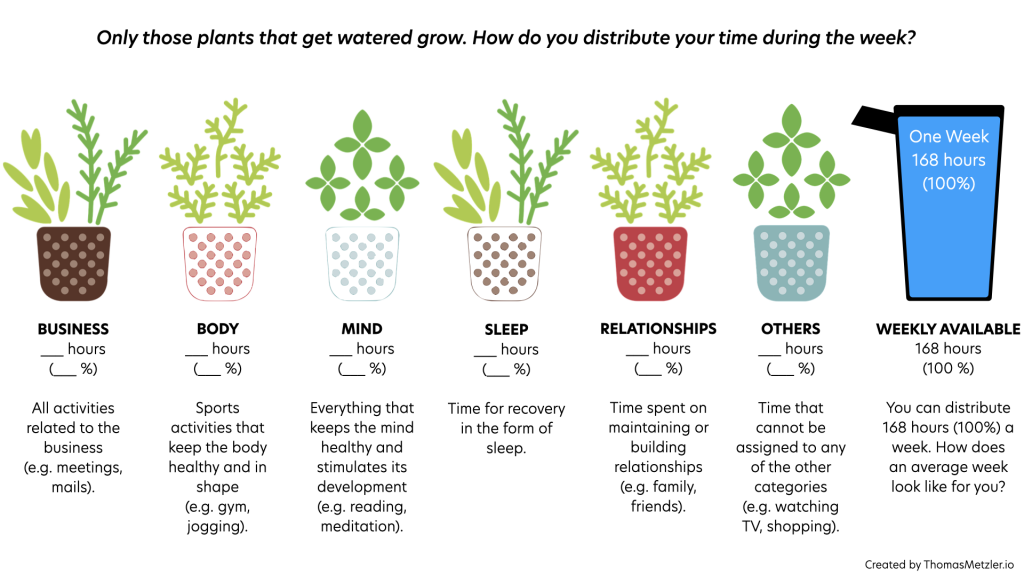When I started my first startup, I thought that I would go all-in for a few years and then after a successful exit I would not have to work my whole life. I subordinated everything in my life to the startup, without compromise. This was a MISTAKE that I would like to PROTECT first-time entrepreneurs from.
However, four years as a first-time entrepreneur with this mindset took its toll. Severe overweight, a serious pneumonia, two herniated discs. I felt uncomfortable in my body, suffered from chronic stress and was not satisfied with my personal development.
And it was not only me. I could observe similar situations with many founders in my network. What they all had in common was merciless sacrifice to achieve a desired goal in the future, regardless of losses.
So what to do? Everyone does it like that! Elon Musk works 120 hours a week. And in his six rules of success Arnold Schwarzenegger says we should work very hard and sleep less. So it must be true.
When I was quite young, I just didn’t know any better. I was caught up in the dogma of the hard-working, all-sacrificing start-up founder.
But what is the solution? Everyone knows that a startup is hard work! Yes, and nothing changes that. Founding a startup is really very hard work. It is an effort to create something new, to breathe life into your idea, to fight against resistance. And yes, many hours of work go into a startup project. There is nothing I can do about that either.
BUT, I don’t push new startup projects any more without considering the costs. There is more to life than the success of a startup. And even after the startup has been successfully sold or has failed spectacularly, life goes on.
A startup is a project lasting several years and the outcome is uncertain. Founders who throw themselves into work without compromise often do so at the expense of their health, their relationships. They may destroy important values for a future worth living. Voltaire correctly recognizes: “In the first half of our lives we sacrifice our health, to earn money, in the second half of our lives we sacrifice our money, to recover the health.”
But what have I learned from 10+ years in the startup scene? What do I do differently now? In my new startup mode, which I am following consistently, I do not neglect the other components that are important for a fulfilled and happy life, such as physical and mental health, personality development or relationships, even in stressful business phases. For this, time must be made available in the schedule. And if you don’t make time available now, your body will take its time at some point, forcing you into a time-out with a herniated disc or a burn-out.
This means that you should consciously and uncompromisingly TAKE TIME every week for the other important things in life. Time for friends, family. Time to read a book. Time for meditation. Time to sleep well. This time is very well invested. It is the basis for you to be able to enjoy the fruits of your possible startup success. And if your startup fails, these areas of life are the basis for a new attempt with your next venture.

And besides. Less hours of work per week do not necessarily mean less output. For many people, an exaggerated expansion of the working week has only one effect, which is nicely reflected in Parkinson’s Law: “Work expands so as to fill the time available for its completion.”
My advice to you is therefore not to invest your time uncompromisingly only in your startup project, but to find a suitable BALANCE for you, which will make you happy in the long-term and which will enable you to pursue your various projects healthy and full of energy.
I have created the following chart, in which you can divide your available hours per week into different categories in order to help you to CRITICALLY REFLECT on your time allocation. As an analogy I have taken six plants. Only those plants that get water and care can grow. The water for the plants is your available time, 168 hours a week. If a plant is not cared for, it can’t grow, or even degenerates. For example, when I first started, I didn’t do any sports for four years. My strength and endurance were severely diminished, almost non-existent. I was very overweight and had severe back problems. It took me another four years to get my body back in good shape. This means that if you neglect some of these life areas in the long run, the damage that is caused can usually not be repaired in the short run. The small plant must then be carefully nurtured again and that takes time.